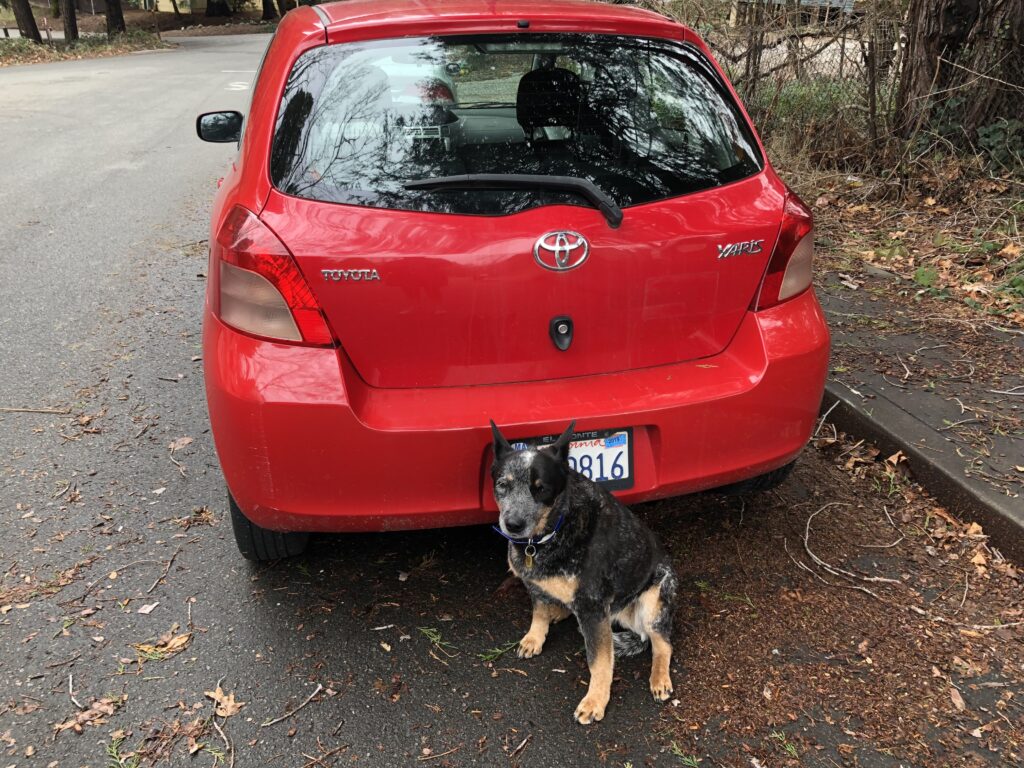
Photograph by Sarah Miller.
In 2007, I bought a brand-new red two-door Toyota Yaris off a lot at a Toyota dealership in the Inland Empire. I think it was about $13,000. I tried both the automatic and the manual transmission. The automatic had no power and because I was often getting on to the 110 freeway, whose on-ramps were about as long as the average hallway in a one-bedroom apartment, I thought the manual would be “safer.” I use quotes here because this car was tiny. If anything ever hit me while I was in that thing I would not be alive to write this. Luckily, nothing ever did.
I remember that as I headed into the dealership to sign the papers, I asked the salesman if I should maybe just try the Toyota Scion, what the heck, and he got very angry and started yelling at me that those cars were fucking garbage and that I should just buy the Yaris I said I had come to buy so that he could finish selling me this car and go sell another one, as God intended, more or less. “Why would you come here to buy a Yaris and walk out of here with another car, a stupid car, a car for A CHILD?” he shouted. I found all this charming, for some reason. I bought the car. I tried haggling. He made fun of me. “You are terrible at this, why try, go home and work and make five hundred dollars, don’t try to make it from me, you will never win. Also this car will make you money because you will never think about it.” And so I got a Yaris and the man was right. That car did what it was supposed to do, which was that it got me around and I never thought about it.
When I bought it, in my mid-thirties, it was one of the only good decisions I’d ever made. My boyfriends were mostly no good or not right. I was so bad with money it was a joke. When I hadn’t made a mess of my career, the economy stepped in to help. I did have good friends, and then later on I had a good dog, and this car made those things better. That might sound weird. But it never failed at getting me from one friend to another, or at getting me and that good dog around to various adventures. In that way, the rare sound judgment I had used in purchasing this car was compounded by the ways it was able to make the better parts of my life easier. The car took care of me and after a while I realized that I wasn’t as bad at taking care of myself as I thought I was.
I liked how it was so small from far away that you felt like you could just pick it up and kick it and it would definitely score you a field goal. There was never anything wrong with it. The air conditioner kicked ass. I would fill the thing up with gas and then just forget about it for a long time, especially since living in Los Angeles I didn’t commute and all I did was drive back and forth from Highland Park to Silver Lake. One day it started to act weird and I took it into the shop. I found out that this car had something wrong with its transmission, and so five or six years into owning it I got a brand-new transmission and then it was like a brand-new car all over again.
A friend of mine and I did have to push this car down a hill while we were trying to jump-start it, and it did indeed also have to have its entire passenger side replaced, which cost about $4,000 at a time when I think the car may have been worth $4,500. But the insurance company let me do it and I had the car for seven more years, into my early fifties. I would’ve had it longer except I took it to the Toyota dealer in Hollywood to fix my air conditioner and he said that was all that was wrong with it, but actually there was something else huge wrong with it, which honestly I couldn’t even tell you. If I had understood anything, then it wouldn’t have happened, although I’m not going to blame myself for not knowing anything about my own car, because I am not a mechanic, I’m just someone who wanted to drive a car around and not think about it. At any rate, thanks to Hollywood Toyota, my car died in the summer of 2021 in Roseville, California, in the middle of an industrial park. It was towed to the Toyota dealership in Roseville and they said that it was completely fucked. I don’t know why and I don’t want to know. I only know that that car was perfect and it was taken from me too early.
I have a Chevy Bolt now. It is a stupid car. It’s an automatic. Automatics are so uncool. I don’t give this car a lot of thought, and that’s good. When you look at it, you think, “Oh, you’re small,” but not “You’re so tiny it’s amazing that you can move but you do anyway.” It doesn’t care about me at all. When I got into my Yaris, I felt that it was greeting me. The Bolt is silent. That’s fine, and it’s good at doing its job, but we are not friends.
Sarah Miller is a writer who lives in California. She writes a Substack.
from The Paris Review https://ift.tt/nXBCtSk
Comments
Post a Comment